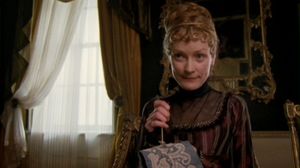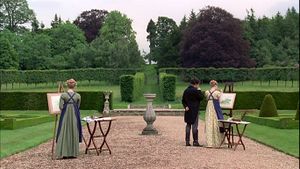Education for Women: Difference between revisions
No edit summary |
m (→Subjects: Added pics) |
||
| (One intermediate revision by the same user not shown) | |||
| Line 12: | Line 12: | ||
===Subjects Girls Are Taught=== | ===Subjects Girls Are Taught=== | ||
* Reading | * Reading [[File:Sewing.jpg|right|300px]] | ||
* Writing | * Writing | ||
* Average Arithmetic | * Average Arithmetic | ||
| Line 22: | Line 22: | ||
* Dancing | * Dancing | ||
* Etiquette | * Etiquette | ||
* Household management ( | * Household management (e.g. household accounts and directing servants as well as what to look for when employing servants) | ||
* Drawing/watercolour painting | * Drawing/watercolour painting [[File:Painting.jpg|right|300px]] | ||
* Scripture ( | * Scripture (i.e. reading the Bible and recognising passages) | ||
''Note that ladies were not expected to know many languages.'' | ''Note that ladies were not expected to know many languages.'' | ||
| Line 91: | Line 91: | ||
If you are interested in any more, you might also look at ''The Gentleman's Daughter'' (http://www.amazon.com/exec/obidos/tg/detail/-/0300080026/qid=1038969308/sr=1-1/ref=sr_1_1/103-2727234-2327820?v=glance&s=books). Although our ladies are slightly higher in status, education for women of this class and the very upper classes and aristocracy would have had a lot of similarities. | If you are interested in any more, you might also look at ''The Gentleman's Daughter'' (http://www.amazon.com/exec/obidos/tg/detail/-/0300080026/qid=1038969308/sr=1-1/ref=sr_1_1/103-2727234-2327820?v=glance&s=books). Although our ladies are slightly higher in status, education for women of this class and the very upper classes and aristocracy would have had a lot of similarities. | ||
[[Category:Articles]] | [[Category:Articles]] [[Category:Educational Establishments]] | ||
Latest revision as of 09:44, 15 February 2017
Part of the Articles series.
Written by Vix.
Introduction
It occurred to me that it is very difficult for us, as modern writers all with very good modern secondary and tertiary education, to appreciate just how limited and how different education was for Regency ladies. The list below should help to clarify things, and my general advice to all would be "If in doubt, leave it out - especially if it isn't arts or literature". Regency women were NOT well educated in the contemporary sense, although without a doubt they were highly literate and cultured.
Remember that most ladies were educated at home. Some went to school, but these could vary wildly in quality. There were no OFSTED inspections to check on standards or even whether the students were being taught a sufficient range of subjects or how they were treated. Education at home could be overseen more closely by the parents (as well as being more exclusive).
Subjects
Subjects Girls Are Taught
- Reading

- Writing
- Average Arithmetic
- Needlework (plain and fancy)
- French
- Some Italian and/or German for singing (fluency would be rare).
- Singing
- Playing an instrument (NB piano, harp, violin or guitar ONLY). Ladies would usually accompany themselves on the piano if singing.
- Dancing
- Etiquette
- Household management (e.g. household accounts and directing servants as well as what to look for when employing servants)
- Drawing/watercolour painting

- Scripture (i.e. reading the Bible and recognising passages)
Note that ladies were not expected to know many languages.
Subjects Useful To Girls On A Superficial Level
Note also that these subjects were taught very differently to the modern era...
- History: learning by heart of dates, monarchs, etc.
- Literature: see article on literature for women. This could include English translations of foreign literature and also an awareness of mythological tales in their English forms.
- Politics: basic awareness of a few key issues & figures, not thorough or fundamental understanding and not detailed knowledge of parliamentary process or individual bills.
- Philosophy: parrot-fashion knowledge of perhaps a handful of ideas and figures.
- Geography: rote learning of countries, capitals, etc. Putting country names on a map was a popular teaching method.
- Botany: rote learning of English names of common plants, but no further.
Obviously some of this will depend on personal interest and family situation, but if your girl has a thorough understanding of several, be prepared for her to be considered a potentially disastrous marriage prospect. Wives and daughters were not supposed to be able to debate and hold an academic discourse!
Subjects No-One Would EVER Teach A Regency Lady
If your girls claim to know these subjects, expect to be thought a liar or to have people wonder where on earth you could have learned them, as well as to be considered very unladylike and unnatural...
- Latin... beyond a handful of very common phrases (think "nota bene", "anno domini" etc) they would pick up generally in society
- Greek
- Algebra or other pure/advanced mathematics
- Law
- Sciences
- Theology (either Christian or other religions)
Sources
Not an exhaustive list, but to give you some idea of academic/contemporary writings on the subject:
http://www.regencylady.net/repository/Education/
Education in Regency England was in nowise equal - not between the sexes, and not between the classes
A lady's education was taken, almost entirely, at home. There were boarding schools, but no University, and the studies were very different. She learned French, drawing, dancing, music, and the use of globes*. If the school, or the governess, was interested in teaching any practical skills, she learned plain sewing as well as embroidery, and accounts.
(*see geography on subject list)
http://www.suite101.com/article.cfm/jane_austen/112564
Education was not regarded as overly important for women in Regency times. Indeed, 'blue-stockings' were derided. Women of the gentry and aristocracy were expected to have accomplishments mostly so that they could be social assets to their husbands* and, of course, to help them attract the husbands in the first place.
(* Being a "social asset" meant neither being an ignorant illiterate nor being an intellectual, but rather being somewhere between the two. A woman who was a social asset would never threaten a man on an intellectual level, but would be able to follow conversations, keep them going, and steer them away from unpleasant areas, even if she was not well versed in the topic. Wit and the ability to turn a pretty or clever phrase was more appreciated than plain knowledge.)
Usually they were taught privately by governesses and specialist teachers, if they could afford them, but some went to school. Usually these were not very good.
However, if women didn't have the education available now, their upbringing was certainly more cultured. Most of the girls in the gentry and aristocracy spoke French, for example, and they often went to the theatre, art exhibitions and concerts. Being able to pen an interesting letter was also a requirement.
Mrs Barbauld, Georgian/Regency essayist and poet:
“The best way for a woman to acquire knowledge is from conversation with a father, or brother, or friend.”
Essay by Daniel Defoe, 1719 (http://www.fordham.edu/halsall/mod/1719defoe-women.html)
[They] should be taught all sorts of breeding suitable both to their genius and quality. And in particular, Music and Dancing; which it would be cruelty to bar the sex of, because they are their darlings. But besides this, they should be taught languages, as particularly French and Italian: and I would venture the injury of giving a woman more tongues than one. They should, as a particular study, be taught all the graces of speech, and all the necessary air of conversation; which our common education is so defective in, that I need not expose it. They should be brought to read books, and especially history; and so to read as to make them understand the world, and be able to know and judge of things when they hear of them.
http://www.pemberley.com/janeinfo/pptopic2.html#accomplishrev
For women of the "genteel" classes the goal of non-domestic education was thus often the acquisition of "accomplishments", such as the ability to draw, sing, play music, or speak modern (i.e. non-Classical) languages (generally French and Italian).
Jane Austen (list drawn from Pride & Prejudice)
Ladies' accomplishments: Playing musical instruments, painting tables, covering screens, netting purses, singing, drawing, dancing, modern languages (ie. French and Italian), reading
If you are interested in any more, you might also look at The Gentleman's Daughter (http://www.amazon.com/exec/obidos/tg/detail/-/0300080026/qid=1038969308/sr=1-1/ref=sr_1_1/103-2727234-2327820?v=glance&s=books). Although our ladies are slightly higher in status, education for women of this class and the very upper classes and aristocracy would have had a lot of similarities.